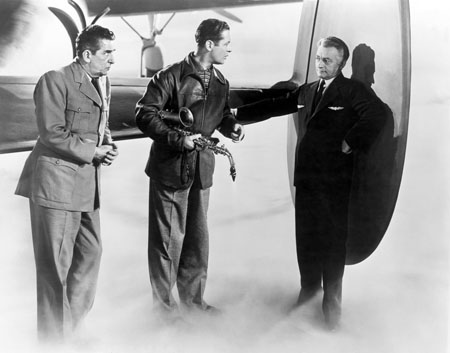
“A HEAVENLY
BEGINNINGâ€
By Raymond Benson
They
must have done something right. Here
Comes Mr. Jordan (1941) has proven to be a timeless and universal movie
that keeps on giving, and the welcome new release from the Criterion Collection
attests to it.
The
premise of the film has been around for a while. Most of our generation know
the remake better—Heaven Can Wait (1978,
starring Warren Beatty and Julie Christie)—which is a superb Oscar-nominated romantic
comedy in its own right. Another remake in 2001, Down to Earth, starred Chris Rock.
But
that’s not all. It wasn’t until I’d viewed the supplements
on the new disk that I appreciated the fact that Mr. Jordan was indeed the first of several Hollywood pictures dealing
with “heavenly†concepts—angels, the afterlife, and second chances. In a video
discussion, critic Michael Sragow and filmmaker/distributor Michael Schlesinger
reveal how the picture’s popularity actually began a trend of similar movies
throughout the 1940s—A Guy Named Joe,
Angel on My Shoulder, A Matter of Life and Death, It’s a Wonderful Life, and even Mr. Jordan’s direct sequel, Down to Earth (1947, not to be confused
with the Chris Rock remake), which features both James Gleason and Edward
Everett Horton again playing their roles from the first movie.

Here Comes Mr. Jordan
was
a major release and surprise hit from Columbia Pictures, a studio that always
struggled to be one of the majors despite having director Frank Capra on their
team in the ‘30s. Critically and popularly acclaimed, the picture successfully
blends fantasy, romance, comedy, and intrigue, creating a delightful, and sometimes
thought-provoking, piece of entertainment. It was nominated for Best Picture of
1941, Best Director (Alexander Hall), Best Actor (Robert Montgomery), Best
Supporting Actor (James Gleason, and he steals the movie!), and Best B&W
Cinematography. The film deservedly won the Oscar for Best Writing, Original
Story, for Sidney Buchman and Seton I. Miller.
The
story concerns Joe Pendleton (enthusiastically played by Montgomery in a
stretch from his usual sophisticated tuxedo-clad characters) as a prizefighter with
a heavy New Jersey accent who crashes in his private plane. His soul is saved
by the Messenger (Horton), an angel whose job is to escort to Heaven the departing
souls from his “territory.†In the mist-filled outskirts of Heaven, Mr. Jordan
(benevolently portrayed by Claude Rains), a sort of St. Peter in a three-piece
suit, checks in the new souls as they board another plane to take them to their
afterlife homes. But Joe’s soul was accidentally taken before his body actually
died—and therefore Mr. Jordan grants Joe a second chance. However, his
consciousness must be placed into a recently deceased person—so Joe winds up
inside a rich, corrupt banker’s body. Joe, in his new persona, sets about turning
the banker’s life around for good, and he also attempts to continue his
prizefighting. For the latter, he calls in his former manager, Corkle (Gleason)
to train him. First, though, he’s got to convince Corkle that he’s really Joe
inside the new man’s form. To complicate things, Joe falls in love with the
daughter (Evelyn Keyes) of a man the banker destroyed financially and sent to
prison. Joe also doesn’t know it yet, but he will have to jump bodies one more
time before the story plays out.
The
comedy and romance work like a charm, and the fantasy elements of Mr. Jordan are surprisingly effective.
The movie is intelligently written and treats its subject matter with respect;
and yet it has fun with the mechanics of death and the philosophical discourse
of what we think the afterlife really is. The audience is tricked, in a way,
into pleasantly enjoying a movie about death. What happens to Joe Pendleton at
the end isn’t the norm for a romantic comedy. Technically it’s not a happy
ending—and yet, it is. It’s a feel-good movie with a bittersweet center. This
is a testament to the quality of writing in Here
Comes Mr. Jordan.
The
new 2K digital restoration looks fabulous. It has an uncompressed, monaural
soundtrack. Along with the aforementioned video conversation about the film,
the supplements include a long audio interview with Elizabeth Montgomery
(daughter of Robert Montgomery, and, yes, the star of Bewitched) about her father and the movie; the Lux Radio Theatre radio adaptation starring Cary Grant (who was
originally approached to star in the film—one can only imagine what it would
have been like with Grant), Rains, Keyes, and Gleason; and a trailer. An essay
by critic Farran Smith Nehme adorns the booklet.
A
little gem from Hollywood released just prior to America’s entrance into World
War II, Here Comes Mr. Jordan is a
genuine classic, arguably superior to its many remakes and imitations. You will
believe...
CLICK HERE TO ORDER FROM AMAZON